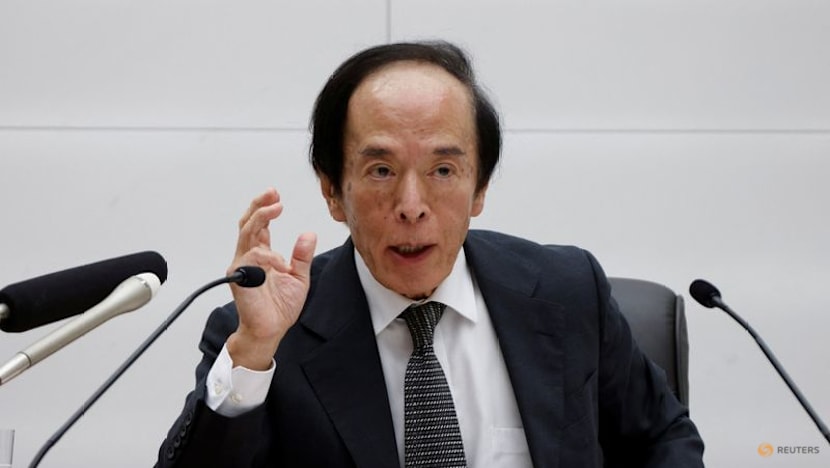BOJ's Ueda warns of global uncertainty, keeps markets guessing on next hike

Bank of Japan Governor Kazuo Ueda holds a press conference after its policy meeting in Tokyo, Japan September 19, 2025. REUTERS/Manami Yamada
OSAKA :Bank of Japan Governor Kazuo Ueda said inflation was on track to durably hit the bank's target but warned of global uncertainties that could discourage firms from raising wages, leaving himself a free hand on whether to raise interest rates in October.
Ueda reiterated the central bank's resolve to continue raising still low interest rates if the economy and prices move in line with its forecasts.
But he said there were various uncertainties surrounding Japan's economic outlook, such as growing signs of labour market weakness in the United States and the expected impact of higher U.S. tariffs on Japanese corporate profits.
"If uncertainty regarding overseas economies and trade policies remains high, firms may place stronger emphasis on cost-cutting and may weaken their efforts to reflect price increases in wages," Ueda said in a speech to business leaders in Osaka on Friday.
The Japanese yen weakened 0.3 per cent to 147.72 per U.S. dollar after Ueda's comments, as some market players interpreted them as reducing the likelihood of an October rate hike.
"There wasn't any clear change in the BOJ's communication that would suggest it was trying to lay the groundwork for an October rate hike," said Shotaro Mori, senior economist at SBI Shinsei Bank, predicting that a hike in December was now more likely than October.
The remarks came in the wake of a U.S. government shutdown that began on Wednesday, which is likely to delay the release of key economic data and complicate the BOJ's rate decision.
While any delay in U.S. data would be a "serious" problem, the BOJ would scrutinise other available data to make up for the loss, Ueda told a news conference after delivering the speech.
Ueda also said he hoped to gather information through talks with policymakers and bankers during the International Monetary Fund (IMF) meeting in Washington later this month, suggesting the gathering's tone on the global outlook could affect the bank's decision on whether to hike in October.
"There's quite significant uncertainty remaining on how tariffs could affect global, U.S. and Japanese economies," Ueda said, though adding the BOJ did not have to await all hard data to determine whether risks have been dispelled.
NOT BEHIND-THE-CURVE
Market players have been closely watching Ueda's comments for any clues on how soon the BOJ will resume a rate-hike cycle that has been paused due to uncertainty over the economic fallout from U.S. tariffs.
A hawkish board split at the BOJ's September meeting and calls for a near-term rate hike by a dovish policymaker have led markets to price in over a 60 per cent chance the bank will hike rates to 0.75 per cent from 0.5 per cent at its next policy meeting on October 29-30.
Ueda said Japan's economy was weathering the hit from U.S. tariffs so far, with many companies armed with buffers from high profits accumulated in the past.
He also said underlying inflation, or the broad price trend excluding one-off factors, will accelerate toward the BOJ's target - removing earlier reference it will briefly stall in a nod to recent mounting pressure from rising food costs.
"Given intensifying labour shortages and rising medium- to long-term inflation expectations, underlying inflation is likely to accelerate in tandem with actual inflation," Ueda said.
The remark compared with language in the BOJ's policy statement in September, which said underlying inflation "will be sluggish due to slowing growth, before increasing gradually."
While rises in food costs will moderate, the pace of slowdown may be smaller than initially thought and could push up underlying inflation, Ueda told the news conference.
"I don't think the risk is high but if so, it requires attention," Ueda said on the possibility of the BOJ being behind the curve in addressing the risk of too-high inflation.
The BOJ has justified going slow on rate hikes on the view underlying inflation, or price rises driven by domestic demand as measured by various indicators, below its 2 per cent target.
The BOJ ended a massive, decade-long stimulus programme last year and raised rates to 0.5 per cent in January, on the view that Japan was on the cusp of durably hitting its inflation target.
While consumer inflation has exceeded 2 per cent for more than three years, Ueda has stressed the need to tread cautiously in raising borrowing costs to ensure price rises are driven by wage gains and robust domestic demand.













